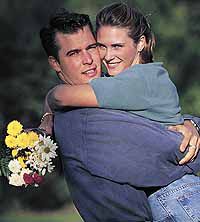| From the moment a couple becomes engaged, they must keep the rules of wedding etiquette in mind. |
Planning a wedding is a tough job. Another thing the bride and groom should think about during planning is to try to heed a few guidelines to make guests, family and friends feel welcome, even if the couple plans to cast tradition aside.
As wedding customs continue to evolve, it gets harder and harder to keep track of what couples should do and shouldn’t do before, during and after their wedding day. To help guide couples through the maze of rules and regulations, follow these tips.
Invitations:
The first connection to wedding guests is through invitations. These informational cards set the tone for the wedding and should reflect the theme and scope of the affair.
*Write full guest names on the inside envelope of the wedding invitation. Only the people listed are invited to the event.
*Don’t write “and Guest” on the invitation. Everyone should try their best to find out whom their cousin or friend will be bringing to the wedding, and include his or her name on the invitation.
*Wedding-invitation wording is a personal preference. Most couples include their parents’ names on the invitations. However, if a parent is deceased, his or her name should not appear.
*If a couple knows a guest is not in a relationship, they shouldn’t feel obligated to offer a wedding invitation addressed for “two.” Subsequently, if they only invited one person and he or she “adds” another guest when sending back the RSVP, do not hesitate to call him or her to explain that financial or space constraints prevent you from accommodating the guest.
*Gift preferences, registries or any other matters involving gifts should not be mentioned on the invitation or included in the package. If a couple has a preference, like monetary gifts or a donation to a charity, spread it through word of mouth prior to the event.
*Don’t use labels on the invitations. They should be handwritten, printed on the envelopes with a nice font using a computer, or done with professional calligraphy.
Financial responsibility:
Finances can turn sweet wedding plans sour. By keeping in mind some general guidelines, things will move more smoothly.
*Tradition once stated that the bride’s parents would pay for the wedding. However, times have changed and more couples are opting to pay for the wedding themselves, or the groom’s family chips in.
*Traditionally, the mother of the bride pays for the bridal shower. The bridal attendants may contribute to the shower’s cost or be designated jobs, such as purchasing favors or decorating the venue.
*Bridal attendants will split the cost of the bachelorette party, and the groomsmen will do the same with the bachelor party, if one is held.
*It is usually the responsibility of the groom’s parents to pay for the rehearsal dinner. The spouses or significant others of wedding party members should be invited to the dinner as well.
Some other items and who should be financially responsible are:
*Rice/birdseed/confetti bags to toss after the ceremony – bride’s family
*If you are following strict traditions, the flowers are divided between the bride’s family and the groom. However, these days, flowers are included in a “package” and usually whoever is paying for the wedding festivities also covers the flowers.
*Marriage license – groom
*Clergyman/officiant fee – groom
*Rings – bride and groom
*Bridesmaid dresses/tuxedos – bridal party or groomsmen
Processional:
If a couple is having a religious wedding, they should consult their priest, rabbi, deacon or officiant concerning the customary procedure for entering. Each house of worship may have rules concerning processional order, music, photos, etc. A couple should keep in mind that stepparents or boyfriends/girlfriends of your parents should enter and be seated before your biological family.
Mother of the groom:
Oftentimes the mother of the groom doesn’t know her place in wedding planning. She does play an important role and can be as involved as the couple would like. Some of her main responsibilities include:
*Initiating contact between her family and the bride’s family.
*Providing an accurate and timely guest list.
*Organizing and hosting the rehearsal dinner.
*Taking her place beside the bride and mother of the bride in the receiving line to thank guests for attending.
Also note that the mother of the bride dictates wedding day fashion, and the mother of the groom will wear a gown of similar style and length.
Tipping:
Gratuities are more often than not included in the cost of wedding services. However, if a wedding vendor, waiter or other person has gone above and beyond the call of duty, extra tipping is appropriate. Here are some people who should receive a tip on the wedding day:
*Coat-room attendant or bridal party attendant.
*Clergyman or officiant should receive no less than $100 for his or her services.
*Limousine driver should receive 15 percent of the bill if a tip hasn’t already been included.
*Organist and musicians at the ceremony should receive at least $50 per person.
*If your reception features a maitre d’ or head waiter who oversees the staff, expect to tip this person as well.
Thank-you notes:
These simple notes are obligatory for each gift you receive. They should be handwritten and should mention the gift given. If a guest gave you money, do not mention the specific amount, but say how you plan to spend it.
Be sure to include your new address on the return-address label so your friends and family will know how to reach you!

